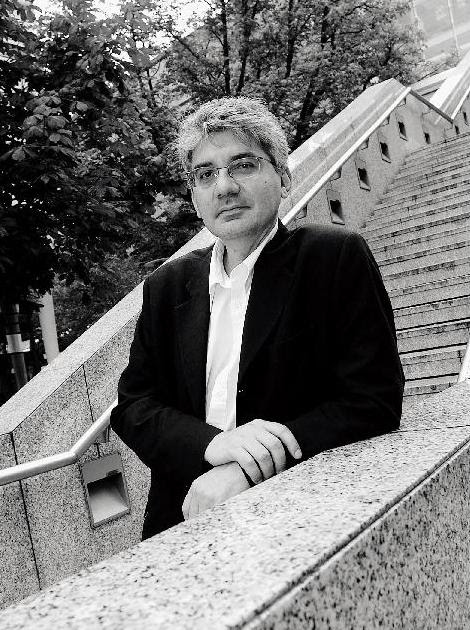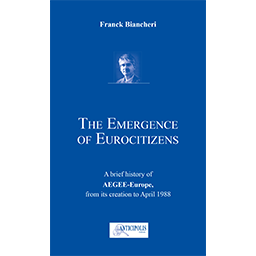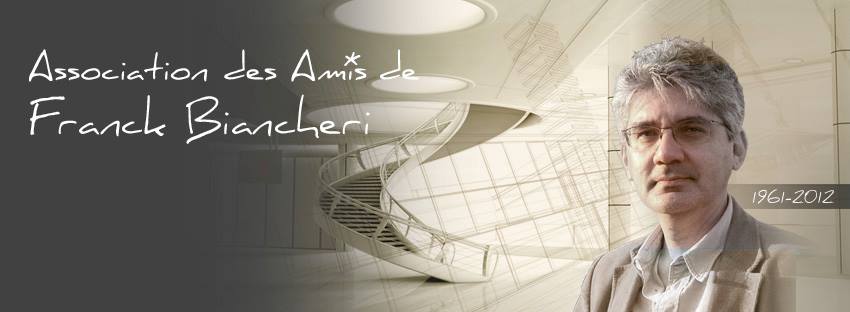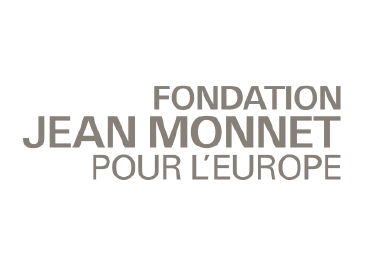Franck Biancheri, 08/02/2004
[divider]
The EPP (European People’s Party) crisis, which the Fidesz (Hungarian conservative right-wing party of Viktor Orban), of which it is a member, threatens to leave (EUobserver: Orban to EPP: turn ‘Christian democratic’ or face challenge) -and therefore jeopardizes the possibility for the EPP to win a strong majority over to a new parliamentary group that could be created after the 2019 European elections with the massive arrival of populist and sovereignist forces- raises once again the question of the legitimacy of these so-called political “European parties”. Indeed, these groups are only the aggregate of a multitude of national parties, and bear the name “European” only because their elected representatives sit in the European Parliament. No common program, no “Spitzenkandidat”, no joint campaign for the European elections, Franck Biancheri designated them under the term “Chinese shadow puppets of European democracy” … An article to rediscover below:
[divider]
 European parties: the Chinese shadow puppets of European democracy
European parties: the Chinese shadow puppets of European democracy
The European Parliament is a huge theater … of Chinese shadow puppets called “European political parties”. Their names are: NGLA, EFA, EGP, PES, EDP, ALDE, EPP, AECR, ADDE, MENF…
Their acronyms are unknown to European voters who would be unable to position them on the political scene, without even to talk about the content of their programs.
These parties have an exceptional characteristic in a democracy: they exist all the time except when they must appear before their constituents. They are figuring those shadow puppets. You think you see a beautiful bird while it is only the shadow of two hands.
The European election will take place in 4 months. The “European parties” hold congresses. Some media report this to see that not much is going on besides strong solemn declarations. It usually teaches that they ask for more Europe and more power for the European Parliament (except the eurosceptics who ask for much more power for the European Parliament, but not more Europe): what a scoop!
For the rest, they bicker about the question of the distribution of future positions, both in the future parliament and in other institutions. These debates make the commentators of the little enchanted world of Brussels and Strasbourg vibrate; when in fact nobody would be able to realy make the difference between a more left or more right European Parliament. It is only a registration chamber of the decisions taken by the administration of the Commission or of the Council; and our friends the MEPs are there to make believe that the “European people” through its “legitimate representatives” imposes its will.
But let’s not forget, in a Chinese shadow puppets theater everything is only appearance. So our European parties, which, in the future, should benefit from substantial European subsidies, just because they exist in the European Parliament (a multitude of European symposia in perspective), move a lot in the corridors of Brussels and Strasbourg; but alas we do not never see them in the streets of our cities.
And, after the adoption (often a very painful act) of “European programs” for the future European elections, and their promise that this time, yes sworn!, they will campaign together before the electors, they are in fact runing in a dispersed, diluted way, exhibiting in fine only national slogans, national programs and purely national issues. The voters of each of our 25 Member States who in June will participate in the European elections (the plural used says everything there is to say) will witness 25 different unrelated campaigns.
This is because our so nice “European parties” cann’t hide no longer the reality: they are not so beautiful birds; they are only the shadow of a manipulation: a manipulation that tries to make believe 450 million Europeans that it is possible to represent European citizens by agregating national political parties, balkanizing the common democracy.
For the moment all the actors (except the citizens and the European project) are happy with this solution: the Commission and Council wear their democratic jockstraps ; national political parties control the European Parliament and prevent any new political competitor could enter it. A place where they also find a refuge for national “has been” politicians and a “golden cage” for convinced Europeans (as well as a good source of fundings).
But beware of the next elections and the years to come. The theater of shadow puppets in order to work needs two other things which are no longer assured: the light and the public. The public deserts more and more the European elections because the show is really indigent; and the candle that illuminates the backlit manipulation could well set fire to the theater with the rise of populist forces.
For the moment everything is fine. Parliament is having fun preparing for the next election. Do not disturb him yet!
Franck Biancheri, 08/02/2004
![]() Download pdf file: “European parties: the shadow puppets of European democracy” (FB, 08/02/2004) ©FB-Documentation 2018 – Association des Amis de Franck Biancheri
Download pdf file: “European parties: the shadow puppets of European democracy” (FB, 08/02/2004) ©FB-Documentation 2018 – Association des Amis de Franck Biancheri
[divider]
[divider]
Franck Biancheri, 08/02/2004
[divider]
La crise du PPE (Parti Populaire Européen), que le Fidesz (parti de droite conservatrice hongrois de Viktor Orban), dont il est membre, menace de quitter (cf l’article sur EUobserver: Orban to EPP: turn ‘Christian democratic’ or face challenge) -et met donc en péril la possibilité pour le PPE de remporter une majorité forte par rapport à un nouveau groupe parlementaire qui pourrait se créer à l’issue des élections 2019 avec l’arrivée massive des forces populistes et souverainistes- soulève à nouveau la question de la légitimité de ces prétendus “partis” politiques “européens“. En effet, ces groupes ne sont que l’agrégat d’une multitude de partis nationaux, et n’ont d'”européen” que le nom parce que leurs élus siègent au Parlement “européen“. Nul programme commun, nul “Spitzenkandidat”, nulle campagne commune pour les élections européennes, Franck Biancheri les désignait sous le terme de “ombres chinoises de la démocratie européenne“… Un article à redécouvrir ci-dessous:
[divider]
 Franck Biancheri, 08/02/2004– Le Parlement européen est un immense théâtre …. d’ombres chinoises appelées « partis politiques européens ». Ils s’appellent PSE, PPE, Verts-ALE, EDD, ELDR, GUE ou ENN. Leurs sigles sont inconnus des électeurs européens qui seraient bien incapables de les positionner sur l’échiquier politique ; et encore moins de dire quels sont leurs programmes.
Franck Biancheri, 08/02/2004– Le Parlement européen est un immense théâtre …. d’ombres chinoises appelées « partis politiques européens ». Ils s’appellent PSE, PPE, Verts-ALE, EDD, ELDR, GUE ou ENN. Leurs sigles sont inconnus des électeurs européens qui seraient bien incapables de les positionner sur l’échiquier politique ; et encore moins de dire quels sont leurs programmes.
Ces partis possèdent une caractéristique exceptionnelle en démocratie : ils existent tout le temps sauf quand ils doivent se présenter devant leurs électeurs. Ils font penser à ces ombres chinoises où l’on croit voir un magnifique oiseau alors que ce n’est que l’ombre de deux mains jointes.
Les élections européennes sont dans 4 mois. Les « partis européens » tiennent congrès. Quelques médias en rendent compte pour constater d’ailleurs qu’il ne s’y passe pas grand chose à part de fortes déclarations solennelles. On y apprend généralement qu’ils demandent plus d’Europe et plus de pouvoir pour le Parlement européen (sauf les eurosceptiques qui demandent bien plus de pouvoir pour le Parlement européen ; mais pas plus d’Europe) : quel scoop !
Pour le reste, ils se chamaillent essentiellement sur la question de la répartition des postes à venir, tant au sein du futur parlement que dans les autres institutions. Ces débats font d’ailleurs vibrer les commentateurs du petit monde enchanté de Bruxelles et Strasbourg ; alors qu’en réalité bien malin qui fera la différence entre un Parlement européen plus à gauche ou plus à droite. Il n’est qu’une chambre d’enregistrement des décisions prises par l’administration de la Commission ou celle du Conseil ; et nos amis les députés européens sont là pour faire croire que le « peuple européen » à travers ses « légitimes représentants » y impose sa volonté.
Mais n’oublions pas, tout est dans l’apparence au théâtre d’ombres chinoises. Alors nos partis européens, qui au passage devrait à l’avenir bénéficier d’importants financements européens de par leur simple existence au Parlement européen (une multitude de colloques européens en perspective), s’agitent beaucoup dans les couloirs de Bruxelles et Strasbourg ; mais hélas on ne les voit jamais en campagne dans les rues de nos cités.
Car après l’adoption (qui plus est souvent douloureuse) de « programmes européens » pour les futures élections européennes , et la promesse que cette fois-ci, juré, ils iront tous ensemble devant le électeurs, ne voilà-t-il pas qu’ils se dispersent, se diluent et in fine n’affichent que des slogans, des programmes et des enjeux purement nationaux ? Les électeurs de chacun de nos 25 Etats-Membres qui en Juin participeront aux élections européennes (le pluriel dis tout) verront donc 25 campagnes différentes, aux thèmes sans rapports les uns avec les autres.
C’est que nos bons « partis européens » ne peuvent pas cacher durablement la réalité : ils ne sont pas de beaux oiseaux ; ils ne sont que l’ombre d’une manipulation : cette manipulation qui consiste à essayer de faire croire à 450 millions d’Européens qu’on peut représenter les citoyens européens par des assemblages de partis politiques nationaux balkanisant la démocratie commune.
Pour l’instant tous les acteurs (sauf les citoyens et le projet européen) y trouvent leur compte : la Commission et le Conseil ont leur cache-sexe démocratique ; et les partis politiques nationaux contrôlent le Parlement européen pour empêcher que des concurrents politiques nouveaux puissent y apparaître. Ils y trouvent aussi un refuge pour « has been » de la politique nationale et une « cage dorée » pour Européen convaincu (ainsi qu’une source de financements).
Mais attention aux prochaines élections et aux années qui suivront. Pour qu’il y ait théâtre d’ombre, il faut deux autres choses qui ne sont plus assurées : la lumière et le public. Le public déserte de plus en plus les élections européennes car le spectacle est vraiment indigent ; et la bougie qui éclaire la manipulation à contre-jour pourrait bien mettre le feu au théâtre avec la montée des forces populistes.
Mais pour l’instant tout va très bien. Le Parlement s’amuse à préparer les prochaines élections. Ne le dérangeons pas encore!
Franck Biancheri, 08/02/2004
![]() Téléchargez le pdf: “Partis européens : les ombres chinoises de la démocratie européenne” (FB, 08/02/2004) ©FB-Documentation 2018 – Association des Amis de Franck Biancheri
Téléchargez le pdf: “Partis européens : les ombres chinoises de la démocratie européenne” (FB, 08/02/2004) ©FB-Documentation 2018 – Association des Amis de Franck Biancheri
[divider]
Visitez le centre de documentation !

[divider]





